第60章 XVIII. "WOULD YOU BE A PARSON?"(2)
Then I saw over in a fenced meadow, to which we were now close, what he was pleased to call "the proposition." Proposition in the West does, in fact, mean whatever you at the moment please,--an offer to sell you a mine, a cloud-burst, a glass of whiskey, a steamboat. This time it meant a stranger clad in black, and of a clerical deportment which would in that atmosphere and to a watchful eye be visible for a mile or two.
"I reckoned yu' hadn't noticed him," was the Virginian's reply to my ejaculation. "Yes. He set me goin' on the subject a while back. I expect he is another missionary to us pore cow-boys."
I seemed from a hundred yards to feel the stranger's forceful personality. It was in his walk--I should better say stalk--as he promenaded along the creek. His hands were behind his back, and there was an air of waiting, of displeased waiting, in his movement.
"Yes, he'll be a missionary," said the Virginian, conclusively; and he took to singing, or rather to whining, with his head tilted at an absurd angle upward at the sky:
"'Dar is a big Car'lina nigger, About de size of dis chile or p'raps a little bigger, By de name of Jim Crow.
Dat what de white folks call him.
If ever I sees hint I 'tends for to maul him, Just to let de white folks see Such an animos as he Can't walk around the streets and scandalize me.'"
The lane which was conducting us to the group of ranch buildings now turned a corner of the meadow, and the Virginian went on with his second verse:
"'Great big fool, he hasn't any knowledge.
Gosh! how could he, when he's never been to scollege?
Neither has I.
But I'se come mighty nigh;
I peaked through de door as I went by.'"
He was beginning a third stanza, but stopped short; a horse had neighed close behind us.
"Trampas," said he, without turning his head, "we are home."
"It looks that way." Some ten yards were between ourselves and Trampas, where he followed.
"And I'll trouble yu' for my rope yu' took this mawnin' instead o' your own."
"I don't know as it's your rope I've got." Trampas skilfully spoke this so that a precisely opposite meaning flowed from his words.
If it was discussion he tried for, he failed. The Virginian's hand moved, and for one thick, flashing moment my thoughts were evidently also the thoughts of Trampas. But the Virginian only held out to Trampas the rope which he had detached from his saddle.
"Take your hand off your gun, Trampas. If I had wanted to kill yu' you'd be lying nine days back on the road now. Here's your rope. Did yu' expect I'd not know it? It's the only one in camp the stiffness ain't all drug out of yet. Or maybe yu' expected me to notice and--not take notice?"
"I don't spend my time in expectations about you. If--"
The Virginian wheeled his horse across the road. "Yu're talkin' too soon after reachin' safety, Trampas. I didn't tell yu' to hand me that rope this mawnin', because I was busy. I ain't foreman now; and I want that rope."
Trampas produced a smile as skilful as his voice. "Well, I guess your having mine proves this one is yours." He rode up and received the coil which the Virginian held out, unloosing the disputed one on his saddle. If he had meant to devise a slippery, evasive insult, no small trick in cow-land could be more offensive than this taking another man's rope. And it is the small tricks which lead to the big bullets. Trampas put a smooth coating of plausibility over the whole transaction. "After the rope corral we had to make this morning"--his tone was mock explanatory--"the ropes was all strewed round camp, and in the hustle I--"
"Pardon me," said a sonorous voice behind us, "do you happen to have seen Judge Henry?" It was the reverend gentleman in his meadow, come to the fence. As we turned round to him he spoke on, with much rotund authority in his eye. "From his answer to my letter, Judge Henry undoubtedly expects me here. I have arrived from Fetterman according to my plan which I announced to him, to find that he has been absent all day--absent the whole day."
The Virginian sat sidewise to talk, one long, straight leg supporting him on one stirrup, the other bent at ease, the boot half lifted from its dangling stirrup. He made himself the perfection of courtesy. "The Judge is frequently absent all night, seh."
"Scarcely to-night, I think. I thought you might know something about him."
"I have been absent myself, seh."
"Ah! On a vacation, perhaps?" The divine had a ruddy facet. His strong glance was straight and frank and fearless; but his smile too much reminded me of days bygone, when we used to return to school from the Christmas holidays, and the masters would shake our hands and welcome us with: "Robert, John, Edward, glad to see you all looking so well! Rested, and ready for hard work, I'm sure!"
That smile does not really please even good, tame little boys; and the Virginian was nearing thirty.